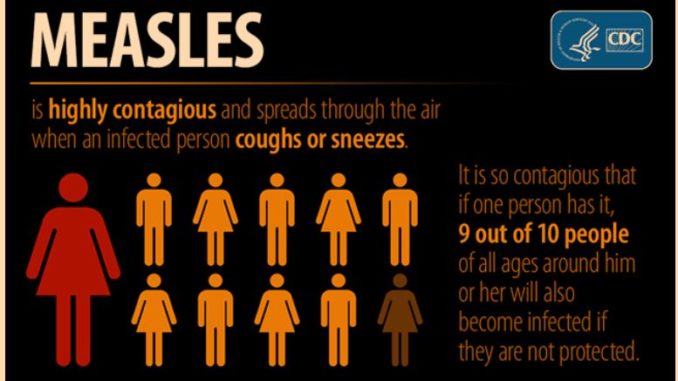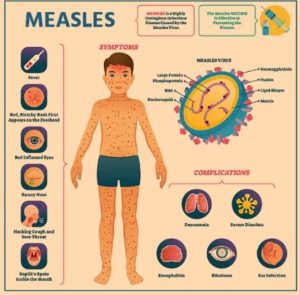
Table of Contents
What is Measles?
- Measles is a highly contagious serious airborne disease caused by a virus.
- The measles is an acute viral respiratory illness that usually affects children and is very contagious to the extent that it can lead to severe complications and death.
- Measles is an airborne disease that is most recognizable for its distinctive red blotchy rash.
- It can easily spread from an infected person through breathe, sneeze or cough.
- The disease can be extremely dangerous, and its consequences might result in hospitalization or even death.
- Rubeola, which should not be confused with rubella (German measles), is another name for measles
Key Facts
- The World Health Organization (WHO) estimates that 207,500 people died from measles in 2019, the majority of them were under the age of five.
- In 2019, there were approximately 869,770 reported cases of measles globally, which is a 50% increase compared to the previous year.
- The majority of measles outbreaks occur in places with low vaccination rates.
- About 94% of the estimated measles cases in 2019 occurred in low- and middle-income countries, according to the WHO.
- Before the introduction of the measles vaccine, there were an estimated 2.6 million deaths annually due to measles.
- However, since the introduction of the vaccine, there has been a significant decline in the number of cases and deaths due to measles.
- The measles vaccine is highly effective, with two doses providing approximately 97% protection against the disease.
Causes of Measles
- Measles is caused by the measles virus, which belongs to the family of paramyxoviruses.
- The virus is highly contagious and spreads through the air when an infected person coughs or sneezes.

Incubation Period
The incubation period of measles is typically 10-14 after exposure to the virus.
Symptoms
Common symptoms of measles consists of:
- Fever
- Dry cough
- Runny nose
- Sore throat
- Inflammation of the eyes or conjunctivitis
- Tiny white spots with bluish-white centers on the lining of the cheek inside the mouth, also referred to as Koplik’s spots
- Skin rash consisting of large, flat blotches that may merge.
Risk Factors
1. Lack of vaccination
- Individuals who have not received the measles vaccine or who have only received one dose are at higher risk of contracting the infection.
2. Age
- Measles is most common in children under the age of five, but it can also affect adults who are unvaccinated or weakened immune system.
3. Weak Immune system
- Individuals with weakened immune systems due to diseases such as HIV or who are receiving immunosuppressive therapy are at higher risk of contracting measles.
4. Crowded living conditions
- Measles is highly contagious and can easily spread in crowded living conditions, such as schools, childcare facilities, and refugee camps.
5. Malnutrition
- Malnourished individuals are at increased risk of contracting measles and experiencing complications due to their weakened immune system.
6. Pregnancy
- Pregnant women who are not immune to measles are at risk of contracting the virus, which can lead to complications such as preterm labor and low birth weight babies.
7. International travel
- Measles is more common in other parts of the world, and individuals who travel internationally to areas with high rates of measles are at increased risk of contracting the virus.
High Risk Groups
- Unvaccinated individuals
- Infants and young children
- Pregnant women
- Individuals with weakened immune systems
- International travelers
Transmission of Measles
- Measles is a highly contagious viral disease that spreads from person to person through the air.
- Droplets of the measles virus are discharged into the air when an infected person coughs, sneezes, or speaks.
- These droplets can then be inhaled by other people, who can become infected with the virus.
- Measles can also be transmitted by touching a surface contaminated with the virus and then touching your mouth, nose or eyes.
- One of the most contagious diseases known to man is measles, which may infect up to 90% of those who come into contact with it if they’re not immune.
Diagnosis
- A doctor will most likely be able to identify measles by examining at the patient.
- Nonetheless, they could request lab examinations to look for the virus in samples of:
- Blood
- Urine
- Secretions from nose and throat.
Complications of Measles
Pneumonia
- This is the most common complication of measles and is responsible for most measles-related deaths.
- Measles can weaken the immune system, making it easier for bacteria to cause infections in the lungs.
Encephalitis
- This is a rare but serious complication that can occur when the measles virus infects the brain.
- Encephalitis can cause seizures, confusion, and in severe cases, permanent brain damage.
Blindness
- Measles can cause inflammation of the eyes, leading to vision impairment or permanent blindness in some cases.
Ear infections
- Measles can cause ear infections that can lead to permanent hearing loss.
Bronchitis and croup
- Measles can cause inflammation of the airways, leading to bronchitis and croup, which can cause coughing, wheezing, and difficulty breathing.
Low platelet count
- Measles can cause a decrease in the number of platelets in the blood, which can lead to bleeding and bruising.
Pregnancy complications
- Pregnant women who contract measles are at risk of premature labor, low birth weight, and even miscarriage.
Prevention
- The best way to prevent measles is through vaccination.
- The measles vaccine is highly effective and safe, and is usually given in combination with vaccines for mumps and rubella (MMR vaccine).
- The vaccine is typically given to children at 12-15 months of age, and a second dose is given between 4-6 years of age.
- Adults who have not been vaccinated or have not had measles before can also get vaccinated.
Other ways to prevent the spread of measles include:
- It is advised to avoid contact with those who are infected in order to avoid contracting the measles.
- Covering nose and mouth when coughing or sneezing
- regularly disinfecting surfaces that may have come into contact with the virus
- Washing your hands frequently with soap and water.
Treatment of Measles
- Getting plenty of rest and drinking fluids can help body fight the infection and prevent dehydration.
- Use of over-the-counter medications like acetaminophen or ibuprofen to reduce fever and relieve pain
- Vitamin A supplements can help reduce the severity of measles and prevent complications, particularly in children with low levels of Vitamin A.
- If complications from measles, such as pneumonia or encephalitis develop, additional medical treatment, such as antibiotics or antiviral medication is needed
WHO Response
- WHO recommends that all children receive two doses of the measles vaccine, which is highly effective at preventing the disease
- In addition, catch-up vaccination campaigns are conducted to vaccinate older children and adults who have not been vaccinated
- WHO recommends that all cases of suspected measles be reported to local health authorities, so that outbreaks can be detected and controlled quickly
- When an outbreak occurs, WHO recommends a rapid response, including enhanced surveillance, immunization campaigns, and case management
- WHO provides support for laboratory testing of suspected cases of measles to confirm the diagnosis and identify the measles virus strain
- WHO promotes effective communication and community engagement to build trust and increase vaccine acceptance, as well as to encourage early reporting of suspected cases and promote healthy behaviors to prevent the spread of the disease
- WHO supports research and development to improve the effectiveness and safety of vaccines and to better understand the epidemiology and transmission of measles
References and For More Information
https://www.hopkinsmedicine.org/health/conditions-and-diseases/measles
https://www.cdc.gov/vaccines/pubs/pinkbook/downloads/meas.pdf
https://www.who.int/news-room/fact-sheets/detail/measles
https://www.mayoclinic.org/diseases-conditions/measles/symptoms-causes/syc-20374857
https://www.nhs.uk/conditions/measles/
https://my.clevelandclinic.org/health/diseases/8584-measles
https://www.healthdirect.gov.au/measles
https://www.betterhealth.vic.gov.au/health/conditionsandtreatments/measles
https://academic.oup.com/jid/article/224/Supplement_4/S420/6378081